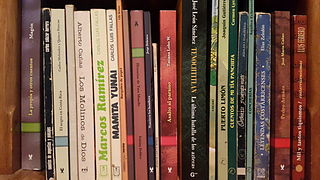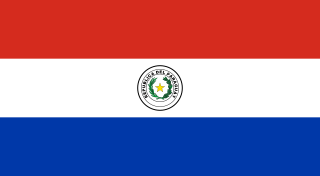 W
WChilean literature refers to all written or literary work produced in Chile or by Chilean writers. The literature of Chile is usually written in Spanish. Chile has a rich literary tradition and has been home to two Nobel prize winners, the poets Gabriela Mistral and Pablo Neruda. It has also seen three winners of the Miguel de Cervantes Prize, considered one of the most important Spanish language literature prizes: the novelist, journalist and diplomat Jorge Edwards (1998), and the poets Gonzalo Rojas (2003) and Nicanor Parra (2011).
 W
WCosta Rican literature has roots in colonization and is marked by European influences. Because Costa Rica is a young country, its literary tradition is also young. The history of Costa Rican literature dates to the end of the 19th century.
 W
WCuban literature is the literature written in Cuba or outside the island by Cubans in Spanish language. It began to find its voice in the early 19th century. The major works published in Cuba during that time were of an abolitionist character. Notable writers of this genre include Gertrudis Gomez de Avellaneda and Cirilo Villaverde. Following the abolition of slavery in 1886, the focus of Cuban literature shifted. Dominant themes of independence and freedom were exemplified by José Martí, who led the modernista movement in Latin American literature. Writers such as the poet Nicolás Guillén focused on literature as social protest. Others, including Dulce María Loynaz, José Lezama Lima and Alejo Carpentier, dealt with more personal or universal issues. And a few more, such as Reinaldo Arenas and Guillermo Cabrera Infante, earned international recognition in the postrevolutionary era.
 W
W W
WHonduran Literature describes the literature birthed out of Honduras. The literary history of Honduras is intersects with aspects of political and socioeconomic atmosphere that has long been prevalent in Honduran history. In the Handbook of Latin American Literature, Salgado claims that the birth of Honduran literature begins with Fray Jose Trinidad Reyes, who founded the first University of Honduras. Unfortunately, the proliferation that was seen in other Central American countries did not appear in Honduras. Furthermore, because the country was under political unrest during much of its history a great deal of the literature remains unpublished a thus, unknown.
 W
WMexican literature is one of the most prolific and influential of Spanish-language literatures along with those of Spain and Argentina. It has internationally recognized authors such as Octavio Paz, Alfonso Reyes, Carlos Fuentes, Sergio Pitol, José Emilio Pacheco, Elena Poniatowska, Fernando del Paso, Juan Rulfo, Amado Nervo, Juana Inés de la Cruz, Carlos de Sigüenza y Góngora, and several others.
 W
WParaguay, officially the Republic of Paraguay, is a country in South America. It is bordered by Argentina to the south and southwest, Brazil to the east and northeast, and Bolivia to the northwest. Although it is one of only two landlocked countries in South America, the country has coasts, beaches and ports on the Paraguay and Paraná rivers that give exit to the Atlantic Ocean through the Paraná-Paraguay Waterway.